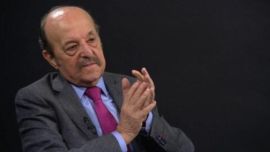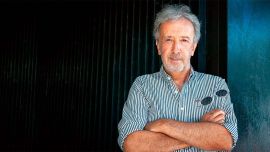Following the surprising announcement of the ruling coalition’s unity ticket of Economy Minister Sergio Massa and Cabinet Chief Agustín Rossi at the expense of the candidacies of Interior Minister Eduardo ‘Wado’ de Pedro and Ambassador to Brazil Daniel Scioli, Juan Grabois decided to stand by his word and run as a presidential candidate for Unión por la Patria.
The presidential hopeful is aware, he says, that his bid legitimised Sergio Massa, just as Scioli was legitimising de Pedro. Happier and more loquacious than ever and knowing that fortune has given him an unexpected opportunity, he concludes: “When it’s power for power’s sake, it’s cheap and not much power.”
I want to begin this interview with “Nothing magical.” How did you manage to put together all the lists in a matter of hours?
We had thought out the electoral process on the basis of analysis, not information, leaving it to chance what might or might not happen. I was certain about two things: that Axel [Kicillof] was going to be governor of [Buenos Aires] Province and that Cristina [Fernández de Kirchner] was not going to be a presidential candidate. No doubt about that from the day she said that she would not be a candidate.
I always thought that the “Draft Cristina” operation was, if we talk in psychological terms, a subconscious boycott of [Interior Minister Eduardo] ‘Wado’ de Pedro by some of those who should have been backing him in order to gain time to reposition. I say subconscious because I do not think it was deliberate nor driven by the people whose love of Cristina is undeniable. If we named our generation the children of 2001, Cristina afterwards used the term “children of the decimated generation” with a plan of human development more integral and competitive than ours, we were going to accompany him [Wado] beyond any doubt and we spent a year with him covering the country. I remember our first assembly was on May 26 in Tucumán when we joined up with teachers, workers both unionised and in the popular economy, businessmen, environmental activists, collectives, everybody. We spent four or five hours at the assembly discussing their proposals. We covered many provinces in person and some virtually, developing a combo between what he was doing at the [Interior] Ministry, which was its Federal Development Plan more centred on questions of infrastructure and the proposals of big businessmen and governors, and what we were doing, more centred on human welfare: health, education, land, housing, employment and care of the environment. And we did combine them, we had an extraordinary programme.
There was even talk of a Wado-Grabois ticket at one point.
There was such talk. I always answered: “It’s not a good ticket” because it offers bread with bread. We obviously have different track records. The militancy emerging from 2001 opened up into two main branches: those seeking their destiny in social struggles together with the poorest and those going for political struggles in the institutions. Wado chose the latter path and I the former – both are valid. Social transformations can come from the institutions or from grassroots organisations, from civil society or from the organised community, as it likes to call itself. We were always in contact with complementary know-how but with very similar conceptual orientations, if you wish, and also geográphic since we are both from Buenos Aires. So I was always thinking of a ticket between Wado and a northerner.
It was a shock because in the last few weeks we were seeing how the Wado candidacy was growing stronger. The day before the video to launch him came out, we signed a 10-point programme, which was a minimal agreement. It was not everything we had been preparing nor everything we wanted but it was what his advisors told him could be carried out without further analysis to make things clear. Having a 10-point platform on concrete issues signed by a candidate is huge for today’s Argentina. The very next day I stepped down from my candidacy, fundamentally because we had achieved our objective. We were always our own Plan B. My candidacy was a back-up in case Plan A, which was Wado, fell through. So when that bucket of cold water came …
I’m not going into details, firstly because I do not believe in analysing politics via corridor or backroom gossip since the phenomena respond to social and historical forces, not chit-chat, but there were conversations that night. We proposed exactly what we said in requesting PASO primaries from within [Unión por la Patria] with unified lists. If we were not granted unified lists, we would run with our own or with just a presidential slate and if not, we would run in the PASO outside [Unión por la Patria]. So as we had already made the case studies, we could react fast to the shock and make our own proposals. In an epic effort we put together the signatures in just 12 hours, scanning documents in neighbourhoods, in provinces, everywhere. Nati Zaracho said: “Why doesn’t Johnny, who was a cartonero [“waste collector”], pick them up?” since he was out collecting signatures. “Does he have his cart?” I asked. “Yes, he does because he’s out working” so I said: “OK, go ahead.” So they picked them up in horse and cart although I wasn’t around when they arrived.
We made it but when I say complying with the signatures “wasn’t magic” it was because there was a political agreement within Unión por la Patria for PASO primaries– not as if Sergio Massa were the candidate and we weren’t. No, we’re heading to the PASO with the same lists and we will try and compete on equal terms, knowing that there is an uneven playing field with the dice loaded in favour of our primary rival and knowing that we have infinitely less funding but we’ll throw everything into it. And also happy to have been consistent with what we are saying because our running-mate Paula Abal Medina, is also a child of 2001, intellectually, a CONICET researcher and a very well-trained woman but apart from that, there is a historic continuity, if you like, with our origins. I don’t believe those origins to be either a virtue or a defect but there is some meritocracy there. One is born with a standard of living which is the starting-point and that is the true injustice of the world, that you are born into position A and others into position B, conditioning your destiny absolutely but as from those conditions, you begin to decide for yourself. But our origins are deeply rooted in the historic national and popular movement and in Peronism. Neither Grabois nor Abal Medina were born in a cabbage, we have something to do with the decimated generation. We have a programme, we belong to the generation of the children of 2001 and I believe that we are sowing a seed that there can be no satisfaction with the definitions taken by leaders on the basis of pragmatic calculations because when politics is merely pragmatic, it stops being politics and passes to being administration.
I interpret your saying “wasn’t magic” as suggesting that there was also an agreement within Unión por la Patria for your candidacy because…
Of course, that’s right.
If not, it might have, on the contrary, been very simple to give Scioli the possibility of participating in the same way as you.
Firstly, it’s like you say. Secondly,in the best of cases, I would have been limited to a presidential slate because in 20 hours I cannot assemble lists nationwide, that’s physically impossible. So anybody with an ounce of sense should have evaluated that many of us are disenchanted with Massa and constitute a complementary element. The Frente [de Izquierda leftists], who many think will be small fry, and ourselves will strive against that because we know... There are also others.
Why do you think PASO primaries between yourself and Massa seemed better to Cristina, the president and other Unión por la Patria decision-makers than between Scioli and Wado? You could say that both line-ups are similar – you share the “Wado mystique” while Massa and Scioli, despite their personal resentments against each other, are ideologically close.
They are multicausal phenomena. There is a first element which Wado lowered to a system perceiving him as competitive with possibilities of winning while not representing the interests of the one percent so he was no guarantee. To describe what I call the system more clearly, it is the International Monetary Fund (IMF), the so-called markets – which are in reality the shareholders of the big corporations because there are markets around the corner of my house and here too is a market – and some geopolitical interests. And obviously the círculo rojo [“red circle”] establishment. So what’s their guarantee? They are given 70 percent of the electorate in options which openly say that they represent their interests.
That’s why the Bolsa stock exchange rose while country risk and the MEP (mercado electrónico de pagos) dollar rose.
Exactly.
Because Massa is market-friendly like the Juntos por el Cambio candidates.
With [Buenos Aires City Mayor Horacio Rodríguez] Larreta, Patricia Bullrich, [libertarian Javier] Milei or any foreseeable scenario, their interests are guaranteed. But it was “checkmate” for those of us who represent other interests.
So you are less dangerous than Wado because you have less chance of winning.
Totally. It’s like going before the story of David and Goliath to the famous anointing of David as king of the Jews by Samuel. And Samuel asked David’s father Jesse: “Who will be your heir?” and he replied: “I have three competitive sons with military training.” Jesse wanted the king to be one of his three sons but Samuel doing the anointing told him: “No, that’s not what it’s about.” The system saw Wado as one of those three competitive sons who could win a military victory so they turned everything upside down.
Could Wado, with Cristina’s support, have beaten Scioli to then reach the run-off and possibly beat the Juntos por el Cambio candidate?
That was what we were all calculating.
While you would not carry that market cost because your candidacy is assumed to be testimonial.
Exactly. But if Goliath existed, so did David so that this history is not written yet. A match isn’t over until it’s over and if we have no money, we have no fear either. Because otherwise you could say: “Juan, you have to be rational, your chances are slim.” Firstly, challenges enthuse me but beyond that, we represent something which is not represented.
[Late president Raúl] Alfonsín said that some defeats have a grandeur which triumphs lack. Testimonial representation is not to be scorned, it doesn’t necessarily have to be all about winning.
Exactly but if we win a good number of votes, it’s a message which conditions the political system.
Were the governors who went requesting that the unity candidate be Sergio Massa representatives of that force?
I don’t want to generalise but I believe that as from the 1994 [constitutional] reform the governors have fundamentally been administrators of the natural resources at the service of the multinationals. In 1994 it was decided to decentralise common property and natural resources.
Which permitted [then-Santa Cruz governor] Néstor Kirchner, for example, to have those famous hundreds of millions of dollars when YPF [oil] was privatised.
Exactly. Some administered correctly and others incorrectly, but what was not possible was a national strategy of using the earnings from natural resources to develop the country and nor could they be exploited sustainably so it’s a disaster. Mega-mining contaminates, yes, contaminates. What is happening in Jujuy with lithium is a disgrace from every point of view, trampling on the rights of indigenous communities in the areas where the resource is looted. It’s as if we were importing cans of tomatoes and exporting tomatoes. We cannot make even the smallest bit of a battery. So what the multinationals think obviously has some influence on the governors of territories with mines and also where soy agribusiness bulks largest. And Wado was, of course, a question-mark there even if Wado isn’t Juan Grabois, in terms of my having decided an absolutely clear position on what to do with mineral resources, rare-earth metals and fossil fuels. And that position is fundamentally the Norwegian model, the generalised nationalisation of the property, and the YPF model – a mixed company, 51 percent public capital, 49 percent market but under professional management – for exploitation and production. YPF is a highly professional company, like the 100 percent state-owned Norwegian oil company, not a labour exchange for militants. So I’m very clear what I’m going to do with that and also the IMF.
When you add up the votes of the two provinces of the two governors who went to talk to Cristina Fernández de Kirchner, they total less than Quilmes. What could have persuaded Cristina Kirchner if not she herself and not the governors used as her argument? I heard your El Destape interview the day before when the interviewer told you: “Come on, Juan, if Cristina had wanted, Wado would be the candidate.” Was it Cristina who decided that the time was not right for Wado to be a candidate?
I don’t want to get into ‘Cristinology.’
Was it the forces represented?
I might tell you which were the other forces who conditioned this.
Did they condition Cristina Fernández de Kirchner or did she make the decision?
If Cristina Fernández de Kirchner were to decide motu proprio, she would be the candidate. Democracy is fundamentally conditioned by two forces: one local and the other mistermed “lawfare.” In other words, a complex of very powerful pressure groups which intervene in the democratic process and, to give you an example which is almost a joke, the day my ticket was made official, the Supreme Court with the signature of its four justices ruled against me.
You said that Massa extorted Cristina by saying that he would abandon the Economy Ministry if Scioli did not drop out. So does Massa also represent the IMF and those international interests?
Massa offers them security. I don’t think your question would even offend him. And sounding out some links I have in the “red circle” establishment, their Plan A is Rodríguez Larreta, their Plan B Massa. And now they see Rodríguez Larreta sliding, their Plan A is Massa, because Bullrich offers no security, they see her as unstable. Milei…
So does Bullrich have the same virtues and defects as Milei in different proportions?
Yes, she has more votes, more of a party machine.
Is it a question of degree but sharing advantages and disadvantages?
She’s more “caste.” Labour minister for the Alliance at the time of the highest unemployment in Argentina, what an oxymoron! And Gerardo Morales Social Welfare secretary at the time of least social welfare. What I feel is that Massa is my internal rival but my political enemies are Patricia and Gerardo. Main contradiction and secondary contradiction.
With the main contradiction I feel that it is the children of 2001 against the fathers of 2001, who are Morales and Patricia Bullrich and Rodríguez Larreta also, all members of the Alliance. And we fought that useless, neoliberal, hypocritical government because they came to clean away the corruption from Argentina and then bought votes with Banelco. I feel that is the battle deep down in Argentina, those who created the system which blew up in 2001 and who want to impose it again.
One might speculate on the current strength of the vested interests but when you analyse that apart from choosing or joining the decision to choose Massa in 2023, she picked Alberto Fernández in 2019 and Scioli in 2015, there emerges a constant which justifies the question: Might it not be that Cristina Fernández de Kirchner declaims something and, as Néstor Kirchner used to say: “Don’t look at what I say but at what I do,” being much more centrist than what might be perceived from her discourse?
I would say that in my view she is very respectful of the institutions, far more than her enemies. And there is a generational theme too, and I do not want to offend anybody with this, but at a certain age you are more worried about preventing catastrophes than generating transformations, which even seems understandable to me.
In my view the catastrophe already exists although as an Indio Solari song says, “it could be worse.” We have half our people sunk in poverty with the purchase of a tiny flat, a hut or a plot of land a privilege for minorities, something which might be absolutely accessible to anybody in Argentina. We produce food, we’re the granary of the world and there is no bread to be bought. We have cows and there is no meat or milk. A level of injustice which for us is intolerable and we do not believe that Sergio Massa represents a perspective of transformation of those structures of power which concentrate wealth in Argentina, the destruction of virgin forest, the burning of wetlands and the social injustice suffered by our people. We don’t want that and hence we are willing to compete.
As a hypothesis, you pick up more votes than expected but Massa still wins... would your votes stay within Unión por la Patria, or could they go to other candidates more to the left?
It will depend on Massa’s capacity to understand how the music sounds and adapt his policies to a synthesis of the electorate as a whole. Some of the measures we propose touch the core of the interests which Massa expresses but others do not. So if he knows how, he should adopt those which don’t –which would not be trivial – such as a lot for each family and a guaranteed minimum job implying a universal right to work along with granting indigenous peoples their communal property deeds and minor market gardeners their orchards or vegetable patches. Things which profoundly transform people’s lives but do not touch the core of the system and if he knows how to listen to that music, he will hold them. If he doesn’t and insists on the precooked phrases and his lack of clarity as to what he is going to do for the daily lives of the Argentine population and not the one percent privileged, he will not retain them and it will be up to him.
One campaign slogan of Patricia Bullrich is said to be: “Larreta is Massa” and you crossed swords with Pablo Duggan in an interview when accused of having been close to some officials of the Macri government you know well...
I know very well both those of the Macri government and Rodríguez Larreta’s City Hall.
So since you know them, are they in essence the same? Is Rodríguez Larreta the same as Massa?
Was it [José] Ingenieros who said “a man and his circumstances”? They are not the same because they have different circumstances. I think that they have a very similar outlook on the economy, politics and life.
[It was José] Ortega y Gasset. And if Massa were in Juntos por el Cambio?
He’d be the same.
And if Rodríguez Larreta were in Unión por la Patria, would he be the same?
You have interpreted me very well but no.
But the context conditions them and modifies them.
And today he’s in the same coalition as I am. Therefore, and I’m very clear about that, whoever wins, wins and whoever loses keeps him company, I hope that my rival has the same idea of things.
We’re reaching the end, these last minutes are to leave the message you see fit.
Our slogan is to make Argentina human. We believe we are entering a process where politics, cultural relations and the very existence of popular majorities are being dehumanised. Our agenda is land, a roof and work, agrarian reform, urban reform and a pluralistic economy.
When we speak of agrarian reform, it annoys a lot of people but that does not imply that we are going to take anything away from anybody. It’s all about taking care of virgin forest and jungle and the wetlands and that the indigenous peoples have their communal property deeds and small farmers their parcel of land for horticulture and to support regional economies so that the milk does not have to go from General Rodríguez to Jujuy.
When we speak of urban reform, we are talking about the combat against idle property via tax mechanisms, like in New York City, or having a small park of public flats for people in need, like in France, or finding some cap for rents between the demands of the associations of tenants and proprietors, as well as urbanising the neighbourhoods with water, electricity, sewage and service lots.
And when we talk about a pluralistic economy, it’s also about giving the private-sector stable ground rules with an efficient public sector, above all such fundamental and essential services as education, health, security and justice, which are all malfunctioning. One sector excluded from the market as formed today is the sector of the popular community where the fundamental value is not efficiency from the mercantile viewpoint but efficiency from the environmental, cultural and social viewpoints – this has, of course, to be promoted transparently and organised by the state.
So there is a core which permits the true grieta chasm to be bridged, the one marked by the poverty line, and if we do not bridge that true grieta, Argentina will not be human and it will be impossible to live there. We will all be dehumanised, those who suffer social injustice and those who by action or omission permit it.
Production: Melody Acosta Rizza & Sol Bacigalupo.
related news

Milei doesn't think Argentina is ready for a free-floating peso yet

Only Trump superfans come onboard for ‘Board of Peace’ signing in Davos

Milei at Davos hails Argentina’s China ties in defence of trade
















Comments